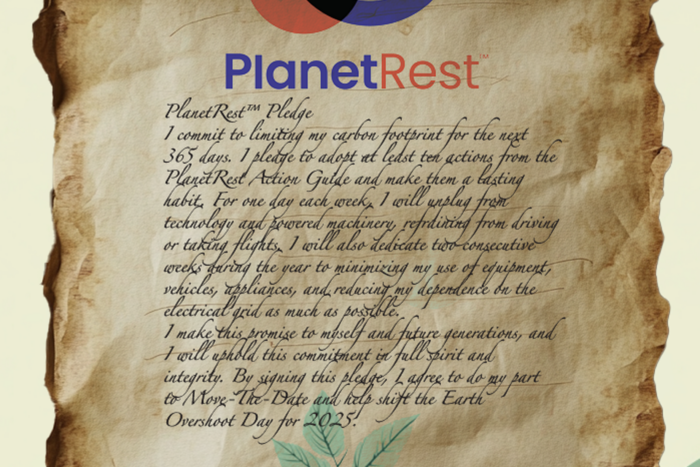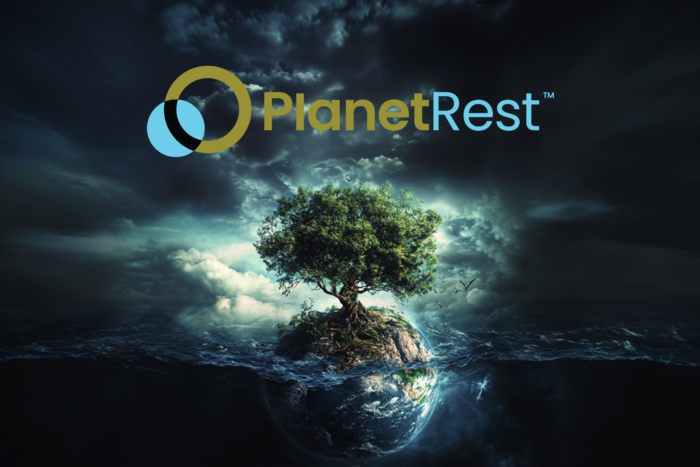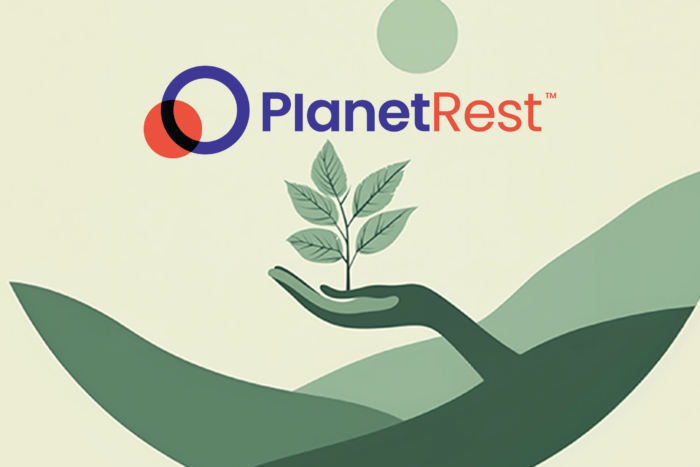
Make a commitment for our children’s future.
Join those who are making a pledge to reduce their ecological footprint by limiting their operations for one day a week and two consecutive weeks a year.
About PlanetRest™
It’s time to give back to the planet that has sustained us for millennia.
The PlanetRest™ initiative unites people across the globe, inviting them to pledge to reduce their ecological footprint. Our mission is to lower carbon emissions and champion projects that foster harmony between humanity and nature. The PlanetRest™ Foundation invests in breakthrough technologies that promote sustainable living. Our philosophy encourages individuals, businesses, and corporations to be mindful of their environmental impact. We must act now, rather than waiting for the next crisis to force change.
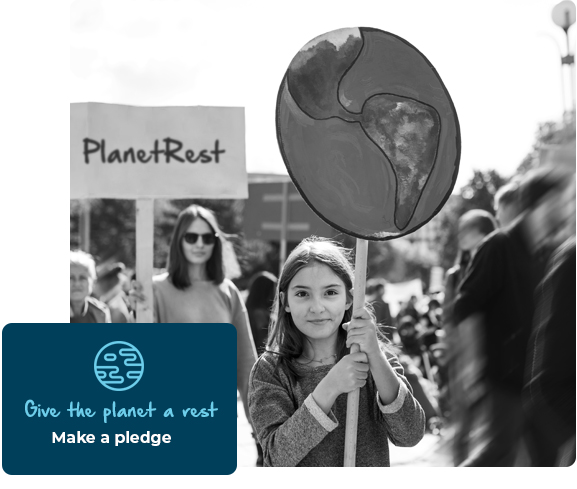

MISSION
Our goal is to inspire people worldwide to give the planet a much-needed rest from constant consumption, allowing it time to heal.
At PlanetRest™, our mission is to give the world—and the planet—a much-needed break. We strive to raise global awareness about the impact humanity has on the Earth and actively fund technologies that offer solutions to reduce our carbon footprint. Isn’t it time we let the planet rest?
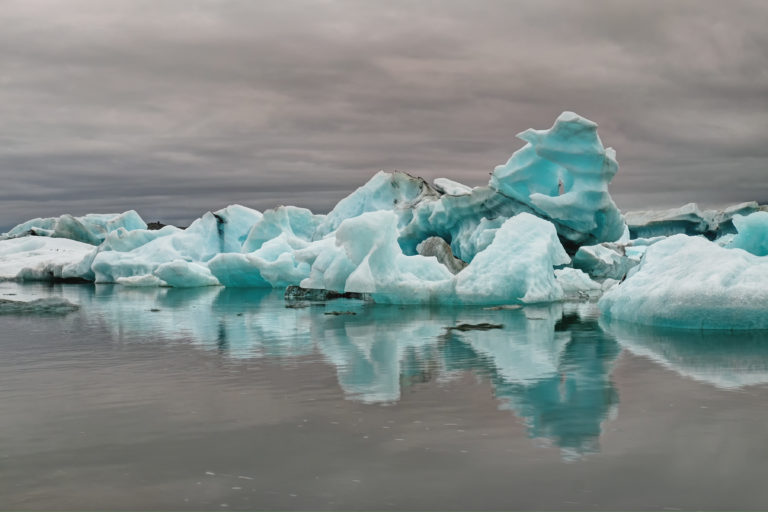
Climate Change
The COVID-19 pandemic forced the world to pause, and with it, human activity slowed—offering a glimpse of how quickly the planet can begin to heal. With cities shutting down and greenhouse gas emissions dropping, scientists have already observed nature's remarkable ability to recover when given the chance. This moment teaches us an important lesson: if we can act decisively in the face of a crisis, we can also take bold steps to fight climate change. The PlanetRest™ initiative aims to move Earth Overshoot Day, the date when humanity’s demand exceeds what the planet can regenerate. By encouraging people to pledge to reduce their carbon footprint and take action, we can shift that date further into the future, giving our planet time to rest and heal. As Kim Cobb, a climate scientist at Georgia Tech, warns, both the climate crisis and the pandemic require "early, aggressive action to minimize loss." Together, we can make the changes necessary to protect the future of our planet—before it’s too late. Let’s move the date, and give the Earth the rest it deserves. By committing, we’re taking a stand for the planet and for future generations. Every action counts, and together, we can make a lasting difference. Join the movement and help us shift Earth Overshoot Day back—one day at a time. The date is July 24, 2025—let’s work together to Move-the-Date.

Air Pollution
Air pollution is responsible for the deaths of approximately 7 million people worldwide each year—a staggering number. Yet, during the COVID-19 lockdowns, something remarkable happened: the reduction in human activity caused a noticeable decrease in air pollution, potentially saving more lives than the virus itself claimed. Scientists have observed cleaner skies and improved air quality, offering a rare glimpse of what the future could look like if we take decisive action against pollution. A 15% increase in death rates from COVID-19 has been linked to just a single microgram per cubic meter increase of fine particulate matter (PM2.5) in the air. This demonstrates how closely intertwined human health and environmental health truly are. If reducing air pollution for just a few months could have such an impact, imagine what we could achieve by making these changes permanent. At PlanetRest™, we believe that reducing our ecological footprint and air pollution is not just possible—it’s essential. By taking collective action and moving Earth Overshoot Day, we can create a future where clean air is the norm, not the exception. Our goal is to inspire change that gives both the planet and its people a chance to breathe easier. Together, we can give the Earth—and ourselves—the rest we desperately need.

Ocean Pollution
Ocean pollution poses a serious threat to both marine ecosystems and human health. Nutrient pollution, plastics, and toxic substances infiltrate our oceans, causing harm to wildlife and ecosystems alike. Marine debris—predominantly plastic—makes up the majority of ocean pollution. These plastics break down into microplastics, which are ingested by small marine organisms, contaminating the very foundation of the food chain. As microplastics are consumed by fish and other sea creatures, the toxins travel up the food chain, ultimately reaching our plates. This creates a dangerous cycle that endangers both marine life and human health. It’s estimated that by 2050, there could be more plastic in the oceans than fish, a chilling forecast that underscores the urgency of addressing this crisis. At PlanetRest™, we understand that reducing ocean pollution starts with individual and collective action. From cutting down on single-use plastics to supporting sustainable fishing and clean-up initiatives, we all have a role to play in protecting our oceans. By taking the PlanetRest pledge and making conscious choices, we can help ensure that our oceans remain vibrant, healthy ecosystems for generations to come. Together, we can stem the tide of ocean pollution and give our planet—and ourselves—the rest we need.

Light Pollution
Light pollution, caused by the overuse of artificial lighting, disrupts ecosystems across the globe. Many species, from insects to birds to sea turtles, rely on natural darkness to navigate, feed, and reproduce. By flooding their environments with artificial light, we disrupt their behavior and endanger their survival. Light pollution doesn't just affect wildlife; it also alters the biochemical rhythms that govern sleep and wake cycles in both humans and animals, leading to a range of health issues. Recent satellite data from the Suomi NPP reveals that a third of humanity can no longer see the Milky Way. In North America alone, nearly 80% of people live under light-polluted skies, cutting them off from the beauty and wonder of the night sky. Beyond aesthetic loss, this disconnect from natural darkness further distances us from the rhythms of nature that sustain life on Earth. At PlanetRest™, we advocate for mindful lighting practices that reduce unnecessary artificial light, helping to restore the natural balance of day and night. By taking small steps—like using motion sensors, shielding outdoor lights, and turning off unnecessary lights indoors—we can protect both wildlife and human health. Together, we can reduce light pollution and give both the planet and ourselves a chance to rest under the stars once again.

Over Tourism
Overtourism, responsible for around 8% of the world’s carbon emissions, is a growing challenge for both the environment and local communities. By 2025, the carbon footprint from tourism is expected to rise to a staggering 6.5 gigatonnes. The environmental toll is immense—overtourism increases water consumption, air pollution, and litter, putting fragile ecosystems under extreme pressure. Popular tourist destinations struggle to manage the sheer volume of waste and pollution, often degrading the very landscapes visitors come to see. Beyond environmental concerns, overtourism has profound social impacts. Local communities bear the brunt of higher costs of living, inflated food prices, and the displacement of long-term residents due to the rise of short-term rentals. While tourism brings economic benefits, it often compromises the quality of life for locals, turning their homes into overcrowded, commercialized spaces. At PlanetRest™, we encourage more mindful travel practices, advocating for responsible tourism that minimizes environmental damage and respects local communities. By supporting sustainable travel initiatives, reducing air travel, and choosing eco-friendly accommodations, travelers can help preserve the destinations they love for future generations.
Take the Pledge
See how to help?

Awareness
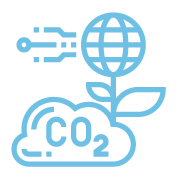
Reduce your carbon footprint

Stick to the pledge

Non-profit
see our latest posts
Feature Stories
planetrest
18 September, 2024planetrest
12 September, 2024planetrest
02 September, 2024
partner with us
If you or your business are ready to join our initiative or collaborate on our mission to reduce the planet’s ecological footprint, we encourage you to contact us and become a part of the PlanetRest™ movement. Together, we can make a lasting impact.
Some of the partners who help us make a difference.








